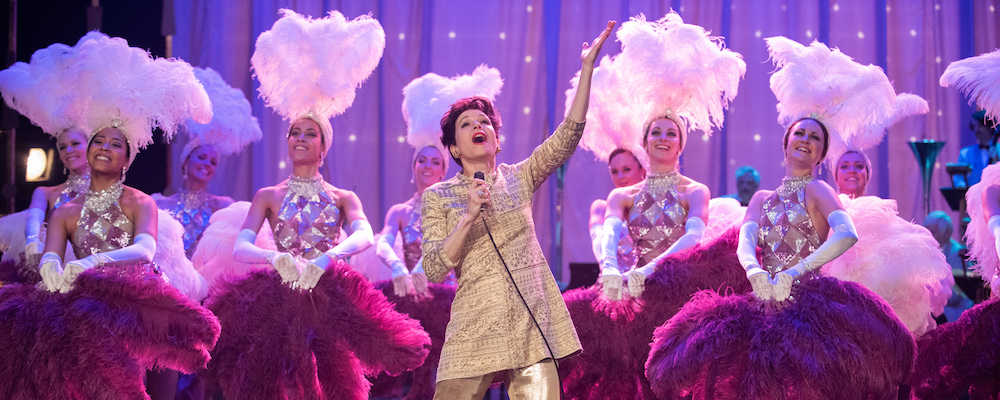‘Judy’: Renée Zellweger Reaches Powerful Heights in Moving Judy Garland Biopic
Alci Rengifo
“Judy” starts at the bottom, after an icon has descended from the heights of prestige. This is what sets it apart from most Hollywood biopics. Making it immensely powerful is a stunning performance by Renée Zellweger, who is not only playing screen icon Judy Garland, she is channeling what became of Garland after show business left her a mere shell. It tends to happen that movies about celebrities follow a specific pattern, usually charting how they rose from obscurity to glory, how they discovered their gift and struggled to find someone powerful enough who notices too. “Judy” feels less like a fairy tale and more like reality. The ride just isn’t always fun for everybody.
In 1968 Judy Garland (Zellweger) is essentially broke, doing gigs wherever possible. Even her two kids are part of the act. It doesn’t always pay well and one night the woman who was once Dorothy in “The Wizard of Oz” knocks on the door of ex-husband Sidney Luft (Rufus Sewell). It turns out Judy has been building a new reputation recently, as unreliable and stuck on pills. Her best chance for a revival is a major gig offered in London to do live performances. Forced to leave the kids behind for now, Judy flies to the U.K. and tries to commit to the shows. Her main handler will be Rosalyn Wilder (Jessie Buckley), who soon realizes how much of a chore it is to get the star onstage amid mental breakdowns. To understand the roots of Judy’s formation the film cuts back in time to her days as an adolescent actress (played by Darci Shaw) when her life was under the iron grip of powerhouse producer Louis B. Mayer (Richard Cordery).
The luster of the old movie titans has faded more every decade as biographies and movies explore their blemishes more openly. “Judy” isn’t necessarily trying to be iconoclastic, because Garland’s sad latter years are well known, instead it wants to present a portrait that could be about any notable talent beginning to fade away. Director Rupert Gold is working from a screenplay by Tom Edge, a writer on Netflix’s “The Crown,” which is based off a play, “End of the Rainbow” by Peter Quilter. It’s a true adaptation in that it never feels like a theatrical piece. Shot with elegance, “Judy” contrasts Garland’s grayer time in London with brightly-lit flashbacks of her days on the set of “The Wizard of Oz,” being denied the simple pleasures of a cheeseburger by the handler imposed by Louis B. Mayer, lest they have a plump Dorothy. She’s also kept going on uppers and sleeping pills. In the opening scenes Mayer famously tells a young Judy that there are probably thousands of prettier girls than her out there, who all want the spotlight, but they could never have her voice. She is turned into a virtual product, to be shaped and controlled, made to learn dance numbers to the point of collapse. If she goes out on a “date” it’s all staged. By adulthood she’s a portrait of stunted personal growth, so used to being a mere stage prop that by middle age Judy is burned out.
The brilliance of the Zellweger performance is how she connects her interpretation to the young Judy of the past. This is Zellweger’s best role in years, full of hidden internal scars that become visible in a frown, a twitch, in Judy crouching in a bathroom minutes before show time. Gone is the vivacious Roxie Zellweger won an Oscar for playing in “Chicago,” her Judy Garland nearly stumbles on stage, slyly grinning at a London audience, cracking a charmingly dysfunctional joke. Zellweger sang the Garland covers herself and never imitates, she instead interprets songs like “Come Rain or Come Shine,” “By Myself” and “The Trolley Song” with her own sense of zest and melancholy. But it is the more intimate moments where the actress delivers her best. Judy, married already four times, hopes to finally discover actual love with fifth husband Mickey Deans (Finn Wittrock), a younger man she meets at a party hosted by daughter Liza Minnelli (Gemma-Leah Devereux). But he will inevitably disappoint, because instead of simply being a real partner men feel they need to somehow inject themselves into Judy’s career. The men in her world always seem to think they know best. Mickey makes big promises he can’t keep and tries to be her manager which is a bad idea in a relationship with someone volatile. But she is a born actress and even after collapsing onstage and fighting with an audience, Judy still manages to convince showrunner Bernard Delfont (Michael Gambon) to forgive her. Everyone around her, especially Rosalyn, see the great and unique talent, but Judy’s greatest enemy is herself.
“Judy” is not without some of the typical faults you find in biopics. Its most notable slip is the ending, which could have closed perfectly with one single shot of Judy stepping back onstage, but then Gold extends it into an overlong, corny moment using “Over the Rainbow.” This takes away from the melancholic power of everything that has happened before in the story. Inevitably we get the obligatory closing epilogue, letting us know Judy would die at the young age of 47 of an overdose.
Even if you’re not a Hollywood Golden Age film buff, “Judy” works as a memorable portrait of a talent in decline. It’s not a pity party because Judy never gives up, even in her lowest moments she has been trained to keep going and hits that stage. Zellweger performs like a woman who needs this music to keep her alive. The craft is her life even when everything is falling apart. “Judy” has a biting honesty to it, made more powerful by an actress equal to the role she is playing.
“Judy” opens Sept. 27 in select theaters.

